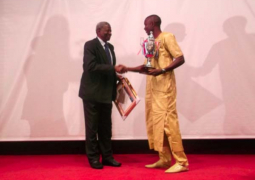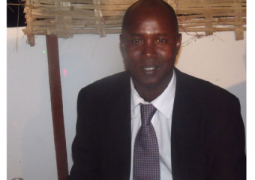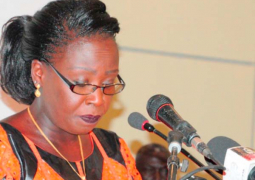The joint session of the Public Accounts and Public Enterprise (PAC/PEC) Committee of the National Assembly Tuesday considered and adopted annual activity reports and audited financial statements by the National Disaster Management Agency (NDMA) for the years ended 31st December 2010 and 2011 respectively.
This adoption came, after the NDMA reports were deferred twice due to the absence of a representative of the governing council.
Presenting the reports, Pulo O.N. Joof, acting executive director of the NDMA reminded the committee that the agency came into being as a result of an Act of the National Assembly called the National Disaster Management Act 2008, noting that its primary objective, among others, included the provision of an integrated and coordinated disaster management that focuses on prevention, preparedness, response, mitigation and recovery from disasters of emergency situations, and the management of their effects.
According to him, the NDMA was able to established 98% of the structures within the Act during the years.
“The latest comprehensive and documented hazard and vulnerability profile of The Gambia (The Gambia living with Hazard Report, 2007) have identified several core biological hazards as posing real potential threats to the country. These include insect infestation and epidemics (malaria, cholera, etc).”
He informed the committee that the country is also experiencing other natural hazards such as bush fires, several floods, windstorms and coastal erosion, noting that the negative socio-economic impact of these disasters is very far-reaching and hampers the achievements of the country’s overall development goals.
Such potential hazards and disasters, he went on, have become major development concerns for the Gambia government, its development partners and the local communities.
“Consequently, both the Vision 2020 and the Poverty Reduction Strategy Programme (PRSP II) recognize the country’s vulnerability and exposure to natural and man-made hazards and disasters as a major and constant threat to the achievement of the Millennium Development Goals,” he stated.
“Since 2006, the Gambia government, with the assistance of the UNDP has taken committed initiatives to develop the national capacity for Disaster Risk Reduction (DRR) by setting up the National Disaster Management Secretariat under the Vice President’s office.”
He added that the Government’s Disaster Risk Management is now focusing more on risk reduction and preparedness rather than on relief and rehabilitation in line with the ‘Hyogo Framework for Action’, noting that other measures taken by government include the establishment of the Disaster Management Council whose membership comprise mainly Cabinet ministers chaired by the Vice President.
He added that The Gambia has also dedicated funds for the disaster management by establishing the National Disaster Fund.
Acting executive director Joof told the committee that the NDMA operates within the five thematic areas of the Hyogo Framework for Action (HFA), African Regional Strategy and the ECOWAS strategy.
The thematic areas, he went on, are: Governance (political commitment), improve, identification and assessment of disaster risk; knowledge and education sharing, reducing underlying risk factors, and effective preparedness and response.
On the achievements, he said the period under review has seen marked improvement towards the objective of institutionalizing disaster management and risk reduction in the country.
Among those achievements, he recalled, are the decentralization of the disaster management structures at regional level, districts, wards and some extend village level with their capacities built; development of website and data base for the agency to enhance information sharing, ease planning and provision of reliable and accurate data; and also the training and sensitization of structures and partners on the institutional framework, among others.
He described resources as key in all operations, without which NDMA would have not been able to achieve the objectives.
Dilating on coordination, Joof said to provide for an integrated and coordinated disaster management, the agency established structures that would ensure effectiveness in the implementation of the desired objectives.
Partnership building and inter-agency network and collaboration, he said, are essential pre-requisite for effective disaster risk reduction, as DRR is a cross-cutting development concern and thus involves everyone, at every level and segment of society which supports development intervention and gains.
“The NDMA being cognizant of this fact was able to establish concrete and meaningful partnership, both nationally and internationally and are geared towards enhancing capacity development, networking, research and best practice.”
In spite of the tremendous progress made by the NDMA in the years, he said the agency is faced with challenges, pointing out resource constraints and inadequate capacity on DRR as an issue of development within Government, NGOs, UNCT and some development partners; low understanding and recognition of the importance of DRR in national development and linking DRR to development in the long term; recognition of the shift from focusing on emergency preparedness and response to DRR, while highlighting challenge in coordination, and timely and appropriate response another challenges faced at the NDMA.
Fatou Sowe-Jaiteh, finance assistant at the NDMA said the monthly government cash allocation for personal emolument and other charges to the NDMA from the Ministry of Finance to Central Bank Account was D4, 046, 273, 98 in 2011.
She revealed that the donation received to the Emergency Relief Fund was D12, 059, 409.95 in 2011.
Auditors queries
Pa Majagne Ndow, external auditor at the National Audit Office, revealed among others things that the NDMA operates a self accounting system, but without its own accounting manual; as such the NDMA is required to follow Government Regulations and Financial Instructions.
According to him, they also found out that there was no segregation of duties, as the Account Unit of the NDMA was manned by one staff, the Finance Assistant who was responsible for keeping all books of accounts including petty cash books and petty cash, fuel coupons and fuel register, cheque books and preparation of cheques and is also a signatory to the operations/subvention account.
He said they also found out that there was a vacant position in the position of Operations Officer in the organizational structure of the agency, which was created in 2009, to be responsible for the day to day operations of the agency.
He added that they also observed the distribution of Relief to Disaster victims without assessment sheets, and also disaster victims were assessed without relief items.
According to him, they also noted that the payment of D137, 964.75 was made to the Minister of the Interior for support for the relocation process of flood victims from Kotu Quarry to Sotokoi, but there was no retirement with regards to the payment.
In the management response to the queries, executive director Pulo O.N Joof said the NDMA is at the verge of appointing a finance and admin director as well as an operations officer.
On the issue of distributing items without assessment and also assessment without relief items, he said the management is taking up the issue with the concerned coordinators, for this is against the norm in disaster operations.
On the payment to the Minister of the Interior, he said the NDMA has made the necessary follow-up but the Permanent Secretary at the Ministry of the Interior who is keeping the documents was in Kanilai for the PS’s retreat.
Ibrahima Sanyang, senior compliance officer at the Gambia Public Procurement Authority (GPPA) revealed that the NDMA was found to be mainly in compliance with the Public Procurement Act and Regulations.
Members then raised questions, concerns, recommendations, observations, and comments, which were responded to by officials of the NDMA before the reports were finally adopted.
Meanwhile, the Gambia Ferry Service is expected to appear before the same committee today.





